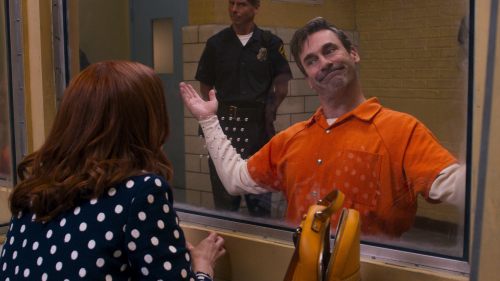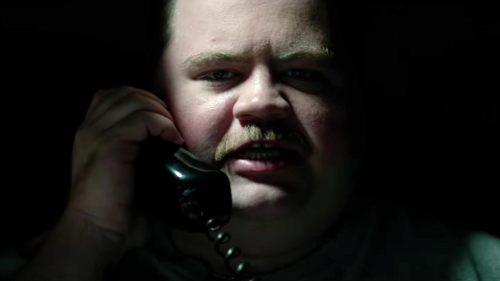MILLION DOLLAR ARM Movie Review: The White Man’s Burden, Baseball Style
On Mad Men Jon Hamm’s glowering faces of annoyance and disapproval are great because we know Don Draper - we’ve seen this guy be excellent at all sorts of things, and so when he’s kind of a dick we have this baseline understanding of what he brings to the table, what it is that gives him the right to drop a stinkeye on some poor copywriter. Take away that background and you end up with Jon Hamm in Million Dollar Arm, where he begins the film as a failed sports agent who spends the entire running time of the movie giving nicer, possibly more capable people the stinkeye. You kind of hate him.
And the movie does something almost laudably brave - it keeps you hating him throughout. His character JB (based, unflatteringly, on a real guy) is a bravura asshole right up until about the second-to-last reel, when he has a change of heart and is a nice guy (sort of. A nicer guy is more accurate) and that changes everything and happy ending. How much of an asshole is JB? He makes the shrill and irritating Aasif Mandvi come across like a breath of fresh air in their shared scenes. Hamm is awful throughout, a gloomy central presence who deflects any humanity directed at him as he pouts and sweats his way through the movie. I watched him in this movie and felt like he must have been betrayed in the edit - there's no way he would willingly modulate his performance in this direction.
Based on a true story, Million Dollar Arm has JB, desperate to pay the rent on his struggling agency, cut a deal with MLB - he’ll fly to India and try to recruit some cricket players for the big leagues. See, cricket has some surface similarities to baseball, and India is a burgeoning untapped market for MLB. They agree on an American Idol-like contest to be called Million Dollar Arm, offering one bowler the chance to join an American team and get a million bucks.
It’s not clear at first, but JB actually has no idea what the hell he’s doing and he bumbles his way through sweaty try-outs all over India, grumbling about the smell. See, bowling and pitching have fundamentally different forms, and a good bowler may be able to throw fast but they don’t have the kind of precision and control that American baseball demands. And so hundreds, if not thousands, of Indian kids find themselves humiliated by throwing baseballs into the heads of mannequins holding catcher’s mitts.
The India stuff is nice if only for the photography; the countryside is gorgeous, and while JB seems to have no interest in his surroundings I sure drank them up. It’s the kind of movie where you get some raga on the soundtrack over wide, golden sunset shots of barefoot village children running after JB’s car, and it’s lovely even if you feel revulsion at the imagery.
And how can you not feel revulsion? JB finds two potential pitchers and brings them, along with their kooky translator, back to the US, but this isn’t their story. This is a white man’s story, the story of how these Indian boys helped JB find himself and also realize that while his guest house tenant maybe isn’t as hot as the girls he usually dates she’s okay for him. She’s played by Lake Bell, and yes there’s a discussion characters have out loud about whether she’s hot enough to date Jon Hamm. You know that maybe she isn’t quite hot enough because at one point she wears a Star Trek t-shirt.
The script, by the usually dependable Thomas McCarthy, is saggy and misshapen, only getting interesting when JB is in India. Once he brings the Indians to LA - and force feeds the poor bastards Papa Johns - everything falls apart. This is the kind of a film where a laugh comes from the trio of Indians being unable to figure out a fucking elevator. They’re innocent childlike morons, whose morning religious rituals other them and whose minimal screentime disempowers them.
I don’t know why the Indian trio is shoved aside so terribly. Indian star Pitobash Tripathy makes his American film debut as the translator, Amit, and the joke with him is that he really wants to be a baseball coach… despite having little experience of baseball! Also, he’s sort of dumb, but in an endearing way. The pitchers are played by Suraj Sharma (the lead in The Life of Pi) and Madhur Mittal, who has the most striking face I’ve seen in a long time. Neither actor is given much to do, and we experience their story steadfastly from the outside. This is, of course, their story, even if the script doesn’t know it.
Craig Gillespie continues his streak of being largely a bullshit director; he fooled a lot of people with the treacly garbage that was Lars and the Real Girl, but his last film - the dismal remake of Fright Night - showed his true level. Million Dollar Arm is a competently made movie that has no control of its themes (there’s no chance anyone involved thought they were making a movie about The White Man’s Burden, but they did) and is so sluggishly paced that it’ll fool many into thinking it’s meaningful. It’s actually just really boring.
As a baseball movie Million Dollar Arm features no actual baseball; while that worked in Draft Day, which was about the dealmaking behind football, in this movie it leaves a major gap. I know there isn’t a ton of actual baseball that was played in the true story, but the way the film takes an hour and a half to get the kids onto a baseball field - if only to practice pitching - absolutely minimizes every aspect of the sport. The whole concept of baseball and pitching becomes abstract; this could be a film about pogs for all the specificity created for its world. Actually, that would have been weird enough to make me like the film.
Watching Million Dollar Arm is disorienting because it’s so clear that we’re watching the wrong story. I don’t want a Crocodile Dundee-esque fish out of water tale about these three Indians, but it feels like the tale of them coming to America and trying to play baseball is THEIR story, not the story of how a grumpy asshole was slightly made less grumpy by their presence in his life. The film is so casually wrong-headed in its storytelling that it personifies the thorny concept of white privilege - it's just so default that a white guy get the center stage that no one involved in the movie considered whether this was actually his story they were telling.



